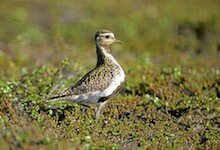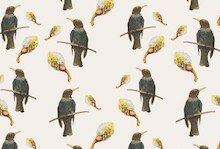
From these particulars
what generality? Some
honesty of the heart perhaps, honest
doubt? honest
helplessness?
Rain
comes again, the birds
cease; beneath their silence
frogs, crickets, the run
of water in guttering, patter
of overflow, soul
opening,
drawing breath.
(‘At Bunga’, Walking to Point Clear)
Brooks was born in Canberra in 1953 and spent his early years in Yugoslavia and Greece. He graduated from the Australian National University (ANU) in 1974, where he completed a thesis on the early poetry of Galway Kinnell before undertaking postgraduate study at the University of Toronto. He taught at the University of Western Australia from 1982-1986, before returning to the ANU where he lectured in English and Australian literature. He is now an Associate Professor of English at the University of Sydney, where he lectures in Australian literature, poetics and creative writing. Brooks also co-edits Australia’s oldest literary journal, Southerly, with Noel Rowe. He has published two full-length collections of poetry, three collections of short fiction and a novel, along with a collection of essays on literature and excess and a short work of ekphrasis on the paintings of Balthus. His first collection of poetry The Cold Front (1983) received the Anne Elder Award while his most recent Walking to Point Clear (2005) was short-listed for the Victorian and South Australian Premier’s Awards. Having been largely silent on the poetry front since the publication of The Cold Front in the 1980s, while he concentrated on fiction-writing, Brooks has two new collections of poetry forthcoming: Urban Elegies (Island Press, 2006) is due to be released in late 2006, with The Balcony appearing soon thereafter. It is a pleasure to be able to offer poems, new and old from all four of Brooks’ collections.
Since the early poems of The Cold Front, Brooks’ poetry has concentrated on the immediacy of the world. At times recalling Pound’s Imagism, Brooks’ poetry has developed into a rendering of a particular and recognizable consciousness opening upon the world and allowing, or attempting, the things and moments that consciousness inhabits and lives through to maintain a degree of mystery and at times troubling independence. Equally throughout Brooks’ poetry there is an ongoing sense of exile from the self, with the near tacit hope that poetry, or the interstices of language and experience, words and things, might offer a way if not to the realization of self and being, then at least to an acceptance of the wandering and erring the chimera of self and words undertakes as they move deeper into the mystery of the self-made-word. This process and the poetry Brooks’ effects recalls Galway Kinell's and Mark Strand’s poetry by degrees, where there is a sense, as Kinell once noted that 'If you could keep going deeper and deeper you'd finally not be a person ... you'd be a blade of grass or ultimately perhaps a stone. And if a stone could read poetry would speak for it.' It is this growing absence of the self within the self that Brooks approaches in his most recent poetry.
At the end of the long silence that followed The Cold Front, Brooks is in the midsts of a fecund period completing three collections of poetry in the last several years. These three new collections develop the promise of The Cold Front into a fully matured voice. Throughout his work Brooks draws closely to his immediate environs and the heartlands of his youth and middle age, the south-east coast, the inner-west of Sydney, and then more recently to newfound richness in the mountainous regions of eastern Europe (which in turn recall his longstanding engagement with the near-mythic mountains of Sei). Unlike his work in fiction, Brooks’ poetry does not attempt to conceive the moment, to draw the world into a concept or toything for consciousness, but allows each moment to breathe into being and pass by. His poetry is simply this, a working of moments, of precision and clarity understruck by the strange mélange of anxiety and anticipation, awe and praise found in the mystics and Symbolists alike. Brooks’ poetry is of the world, of the quotidian and the deep field. It is a work of immanence and vision, at once abandoned to and abandoning the speaking self to poetry.
Poetry
Five Poems, Dreadnought Publishers, Toronto, 1981.
The Cold Front, Hale & Iremonger, Sydney, 1983.
The Dead, Vagabond Press, Sydney, 1999.
Walking to Point Clear: Poems 1983-2002, Brandl & Schlesinger, Blackheath, 2005.
Short Fiction
The Book of Sei and other Stories, Hale & Iremonger, Sydney, 1985.
Sheep and the Diva, McPhee Gribble/Penguin, Ringwood, 1990.
Black Sea, Allen & Unwin, Sydney, 1997.
Novels
The House of Balthus, Allen & Unwin, Sydney, 1995.
Critical
The Necessary Jungle: Literature and Excess, McPhee Gribble, Ringwood, 1995.
De/scription,Vagabond Press, Sydney, 2000.
As editor
Poetry and Gender (edited with B. Walker), Univ. of Queensland Press, St Lucia, 1989.
A.D. Hope: Selected Poems. Sydney: HarperCollins/A&R, 1991.
The Double Looking Glass: New and Classic Essays on the Poetry of A. D. Hope, Univ. of Queensland Press, St Lucia, 2000.
Selected Poetry and Prose of A. D. Hope, Halstead Press, Sydney, 2000.
Essays available online:
'Petit testament: A reading'-an examination of a poem by hoax-poet Ern Malley. Published in John Tranter (ed.), Jacket, http://jacketmagazine.com/29/brooks-petit.html
/>
'Le Panier Fleuri: The Text and Texture of Les Déliquescences of Adoré Floupette'. This essay is a part of a larger project investigating the French dimensions of the Ern Malley Hoax, and in particular its relation to a set of parodies of the ‘decadent’ poetry of Rimbaud, Verlaine, Mallarmé and others, created as deliberate nonsense by the poets Henri Beauclair and Gabriel Vicaire and published in Paris in 1885 in a collection entitled Les Déliquescences under the name of the non-existent poet ‘Adoré Floupette'. Published in John Tranter )ed.) Jacket, http://jacketmagazine.com/29/brooks-mallarme.html
/>
University of Sydney page: http://www.arts.usyd.edu.au/departs/english/staff/profiles/brooks_d_g.shtml







